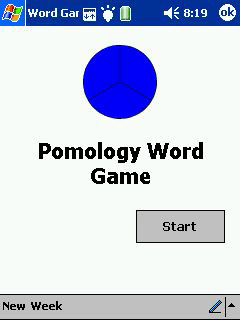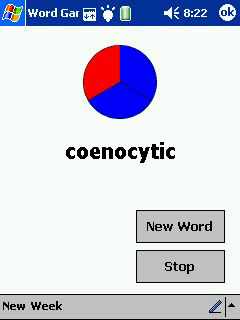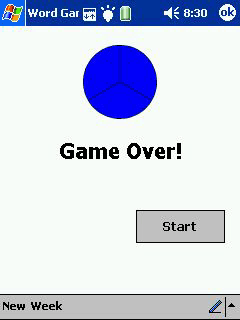| |
When a PDA is a Hot Potato “It’s a short, woody perennial,” one student shouts out to the rest of his Plant Biology (BIS 1C) discussion group team. He fidgets with the PocketPC, lent
While this lively group of students may seem to be playing a video game instead of tending to coursework, they are actually doing exactly as their professor asked. They are working their way through Pomology Professor Ken Shackel’s “Beat Around the
Program developer Earl Schellhous says “Beat” is like a high tech version of “Hot Potato.” After a clock on the PDA is set, one player is given a word (such as “bush”) for which he must provide hints to his team in order to provoke them to guess the word. This forces the student to use scientific terminology (“short, woody perennial” for “bush”). When the team guesses correctly, they pass the PocketPC to the next team. The team that has the PDA when time runs out loses. The PDA “hot potato” features an animated circular timer. “As time runs out in the game, the small circle at the top of the screen moves from green to yellow and from yellow to red,” Schellhous explains.
Ken Shackel proposed the idea for the game to Mediaworks in hopes
that it would make the vocabulary-learning process easy, enjoyable
and interactive for his students. “The game allows the students
to have fun with the vocabulary and think about how it is related
to other concepts they’re learning,” he says. “We are very pleased that the game worked well for Professor Shackel,” Gibson explains. “We are now putting together some finishing touches that will give the game a more professional and interesting appearance.” According to Shackel, students can download the game from his Web site and upload it onto their PocketPCs. The program isn’t yet available for Palm devices. Schellhous adds that although the game currently runs only on certain Windows CE platforms, he is working on making the program more compatible for multiple kinds of PDA devices. “We just purchased a product called AppForge, which will allow us to make a version of the game that will run on Windows CE, PocketPC, Palm and Symbian systems,” Schellhous explains. Gibson hopes that Shackel’s PDA program will prove useful to other academic departments on campus in the future. “We hope to be demonstrating it to language instructors and other interested faculty in the near future,” Gibson says. “Our mission is to think of projects in terms of their usefulness to the institution as a whole, rather than to just one individual or to just one course. In this instance, there are a number of
Schellhous adds that, “certain specialized areas, such as
the medical school, encourage students to use a tool that will always
have a special niche in the learning process. I’d like to
see us develop more programs for PDAs.” |




